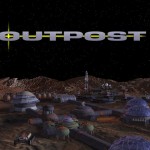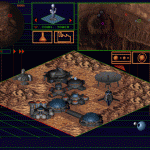classic sci-fi time-wasters (1 of 4): Outpost
¶ by Rob FrieselA little while ago, during the drive home from Maine, I was struck by some odd reminiscence for a few classic (nee “old”) science fiction games I used to play on the computer. By classic, I don’t necessarily mean that they were best sellers 1 or even particularly good games 2. No, by “classic”, I mean only that these were games that I played “back in the day” 3 — sometimes ad nauseum — with a great deal of enjoyment.
As the drive continued and the reminiscing went on, I made up my mind to do a series here on F_D — a kind of “top 4” of these classic sci-fi time-wasters. I’m going to take a look at four “old favorites”, make a few remarks on what made them great (or at least fun), and then discuss a little about their replayability and how they might be different if they’d been made in the past year or so.
I’ll start with Outpost.
More so than anything else, what attracted me to Outpost was that it was allegedly rooted in hard science. Sierra On-Line enlisted the assistance of a NASA scientist to nail down some of the facts, theories, and other elements of the game. The idea was that this would be a world-building style game where you were faced with the awesome responsibility of building your self-sustaining colony against the ruthless, realistic universe. For Deep Nerds, there is something very romantic about this and (in a way) it’s almost the antithesis of the world-building allure. Under any other conditions, world-building games have that “I am God” quality 4 that tickles the power fantasies of those that play them; Outpost turns that on its head by putting realism back into the equation and forcing you to worry about things like providing food, power, fresh water, shelter, etc. for your colonists.
What a novel idea!
So they pepper the game with realistic theories for how your colonists arrive at this planet at relativistic speeds, how they’re stored in hibernation, how you build housing underground to protect them from radiation, how you build agricultural pods, how you power the colony with a Tokamak fusion reactor etc. etc. But eventually, all that realism becomes kind of…. Heavy-handed? Linear? After a few hours of gameplay, it becomes more of an impediment than a novel approach to the game mechanics. Granted, if you like world-building games, there is a part of you that’s willing to over-look all that to just keep playing. “One more turn…” you say, hoping that the next big research breakthrough is around the corner and you’ll find yourself (finally) in “win conditions”. But fighting the elements (e.g., solar radiation, starvation, etc.) lacks dramatic tension.
To their credit Sierra On-Line tried to add some of that dramatic tension by adding a “rogue colony” to Outpost — it’s a second, splinter colony competing with you for dominance on this vaguely habitable but hardly hospitable rock. But that “rogue colony” is never fully realized. You can find it but it’s never populated. They never strike out at you, they never become a threat — despite what the game manual says. I wonder if they excised that part of the game on purpose. Was this to underscore the isolation that you’re supposed to feel? Are you supposed to discover this deserted colony and think to yourself: We are lucky to have survived? Or did they just run out of budget and development hours and forgot to comment out this section of the code?
Circling my thoughts back onto the “rogue colony” element, I do think that it would have added something to the gameplay experience. It could have been much more successful. But then it would basically have been Alpha Centauri 5.
And for that reason, I’m not so sure that there is anything they could have done differently to make this game better — aside from completing the features that appear in the documentation. Since the focus is on being an isolated colony, it’s not as if it would have benefited from more/better online gameplay. Perhaps if it were made recently it would have better graphics — 3D pan-arounds, zooming like in Civilization IV, that sort of thing. Maybe the ability to create and/or download new planets and maps? Tough to say… In the modern world-builder game marketplace, this one would likely get washed out and lost in the noise. But it was fun while it lasted.
Next up: Lightspeed…
- Though a few of them were, and some were even award-winners.[↩]
- Though that’s a subjective argument we won’t even begin to broach here.[↩]
- Though “back in the day” ranges here from “the days of DOS and 5¼ diskettes” to “among the first CD-ROM games I played”.[↩]
- I’m convinced it’s built right in to the technical requirements; start with the original SimCity and work forward.[↩]
- Which I’ll admit was another personal favorite that sucked hours and hours from me. But let’s not get into that here.[↩]
About Rob Friesel
Software engineer by day. Science fiction writer by night. Weekend homebrewer, beer educator at Black Flannel, and Certified Cicerone. Author of The PhantomJS Cookbook and a short story in Please Do Not Remove. View all posts by Rob Friesel →3 Responses to classic sci-fi time-wasters (1 of 4): Outpost
Pingback: classic sci-fi time-wasters (2 of 4): Lightspeed at found_drama
Pingback: classic sci-fi time-wasters (3 of 4): Privateer at found_drama
Pingback: Recent Links Tagged With "timewasters" - JabberTags


Leave a Reply